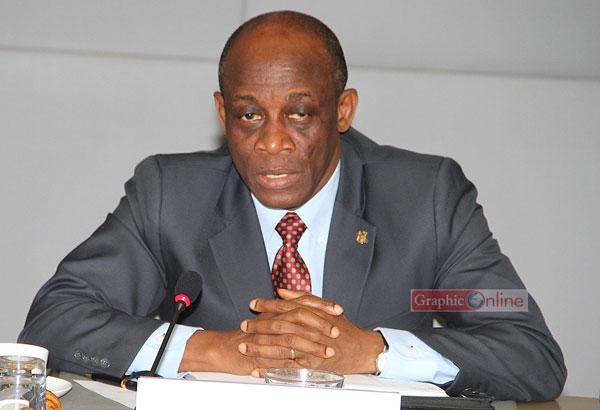
Economy back on growth path — Terkper
The Minister of Finance, Mr Seth Emmanuel Terkper, has stated that Ghana’s economy is getting back on the path of growth as a result of a sustainable home-grown policy that has been adopted by the government.
He said with the current trend, the World Bank had projected a growth rate of between seven and eight per cent in the next two to three years.
He indicated for instance that the government had slowed down on borrowing in order not to increase the country’s debt stock which currently stands at about US$28 billion, while it had resolved to concentrate on completing pipeline projects so as not to put pressure on the budget.
Mr Terpker, who spoke in an exclusive interview with the Daily Graphic last Tuesday, said the factor that mostly affected growth of the Ghanaian economy was the disruption in gas supply from Nigeria, which also resulted in massive layoffs, as businesses could not get power to work.
“Tax revenue also reduced because employment lowered due to the layoffs but, nonetheless, the government decided not to give handouts because that was not sustainable,” he said.
Touching on how the impact of the growth would be felt by all, the Finance Minister said: “The restoration in the pocket will not happen or cannot be sustained by the government giving handouts. Over a long period, it cannot be sustained because businesses are not working, so simultaneously tax revenues are going down’’.
Steps taken by government
Mr Terkper, however, added that as a result of the emergency power put in place ahead of the coming on stream of the Sankofa oil fields, workers who had lost their jobs had been recalled because of the improvement in power generation and the lot of workers had been improved.
He said it was the desire of the government to employ a more sustainable growth path, which had informed the country’s return to the World Bank for a partial risk guarantee to develop the country’s own gas source.
“And so a World Bank partial risk guarantee will be taking between $400 and $500 million of my scarce IGF resources which I probably would have given out as handouts, but I am saying a more sustainable solution is to get that guarantee in order to secure the needed investment to bring that gas on stream.
“And so the foresight to support the private sector with those measures is yielding results. TEN Field is already adding about 25,000 or so barrels of crude oil per day. If we had been short sighted and just giving out largesse, we wouldn’t have TEN Field today’’, he stated.
The Finance Minister expressed optimism that for the first time, Ghana would see a home-grown IMF programme that would result in turning the economy around and backed by a plan to lower debts, to bring massive investments in terms of oil and gas.
Moratorium on new contracts
To ensure that only pipeline projects were tackled, Mr Terkper said that a moratorium had been imposed on all new projects except where they were very necessary.
He disclosed that to make good its plan to execute only projects that had already been started, a contract data base had been compiled on all outstanding projects across the country.
“Ghana never knew how many contracts were in the system and that is one of the biggest headaches Ghana has always had - overshooting the budget. So when we did that data base, we realised that we had nearly about 3,000 or so projects here and there from education to health to others’’, he stated.
